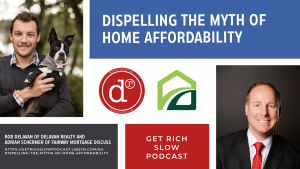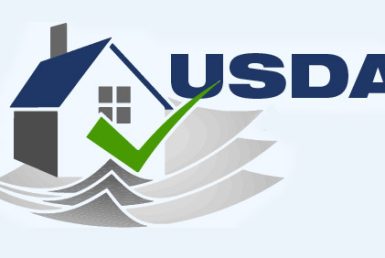Dispelling the Myths of Home Affordability – Podcast

Dispelling the Myths of Home Affordability Podcast

Transcript Intro
Wish we knew a decade ago how to get the most out of our financial life. Today this podcast will provide you with insight into wealth building activities and practices that can expand your net worth exponentially. Get insight from top professionals who will reveal how to build wealth the long way, work smarter, not harder and identify your financial blind spots. With over 25+ years experience as licensed real estate professionals, and a long track record of winning for their clients, Rob and Adrian will teach you what it takes to be an everyday real estate millionaire. Tune-in and let us know what you think! Don’t forget to subscribe, rate, and review!

Adrian & Rob
Hello and welcome again, Future Millionaires. This is Adrian Schemer here at the get rich slow podcast, I’m joined by my co-host, Rob Delevan.
Adrian
Today, let’s attack the myth, that owning a home is more difficult on average, than it was previously. There are some truths to this, right? We look back economically, there’s some times in the 60s and 70s, the classic model of the one breadwinner supporting a family of four , that’s mostly gone out the window. But in modern times with average household incomes, relative to average mortgage payments based on average purchase prices, we’re going to be using some aggregate data here from across the country. Rob, would you say that we’re going to show why it may be actually more affordable at this point in time?
Rob
Well, not necessarily more affordable, but definitely doable. Let’s do a warning to the audience, Adrian and I are gonna geek out a little bit today, right? Numbers day, we’re using the affordability index and most of our data comes from the National Association of Realtors. There’s also some different reports there they rely on – the Census Bureau information Bureau of Labor and Statistics and different things like that – essentially credible data sources. This is data aggregated from real sales. Real consumer level data, and assuming we get permission from the National Association of Realtors to redistribute their document we make it available as a podcast link soon. If not, you can always get the information from us, just request it.
Adrian
But this is at the very least this is a peek behind the curtain. This is the data that your realtor, if they’re good, has access to and is using to help guide your decisions.
Rob
So, about the affordability index, what is it? It basically measures whether or not a typical family could qualify for a mortgage loan on a typical home. A typical home is defined as the national median priced existing single-family home as calculated by the Association Realtors on the national level, and we’ll be talking on the national level today but note, Adrian and I happen to be in the Portland, Oregon market and also look at those statistics and discuss them with our clients too.
Of course, we’re licensed in Oregon to do what we do but today we’re going to talk on the national level specifically and looking at how the typical family is defined as one-earning in the median family income as reported by the US Bureau of the Census. And we’ll also look at the prevailing mortgage interest rate, which is the effective rate on loans closed on existing homes from the Federal Housing Finance board. So, that’s where we’re getting our sources of data.
Adrian
Yeah, and I think it’s important. Just to note, those figures are off of actual closed loans, that’s not advertised rates, which are often lower because they’re laden with points. This is what people actually close their loans with, and the rate that they’re actually paying.
Rob
So these components are basically put together and used to determine if the median income family can qualify for a mortgage on a typical home. Then, to interpret our numbers, the value of 100 means that the family with a median income has exactly enough income to qualify for a mortgage on the median priced home. So an index above 100 signifies that the family earning the median income has more than enough income to qualify for that mortgage loan on that medium price home. Also, the report assumes a 20% down payment. Now, we will meander in this conversation a little bit on the fact that yeah, you can put 5% down or even 3% down, but now mortgage insurance comes into play and other things to discuss. And this is where we have those specific conversations with those buyers and sellers. In this case we gather info and advise the buyer. Like, does it or doesn’t it make sense to do a more expensive loan? Let’s look at your income and see what is the best short-term and long-term mortgage and loan decision. Today we’re exploring the limits of what people can and can’t do…
Listen and learn more – https://podcasts.apple.com/us/podcast/dispelling-the-myths-of-home-affordability/id1558292234?i=1000517154127





